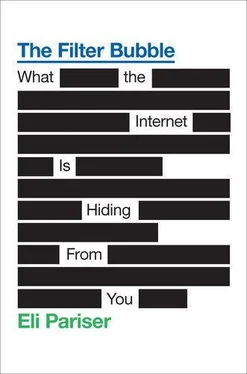Lippmann had watched with disgust as newspapers had effectively joined the propaganda effort for World War I. In Liberty and the News, a book of essays published in 1921, he angrily assailed the industry. He quoted an editor who had written that in the service of the war, “governments conscripted public opinion…. They goose-stepped it. They taught it to stand at attention and salute.”
Lippmann wrote that so long as newspapers existed and they determined “by entirely private and unexamined standards, no matter how lofty, what [the average citizen] shall know, and hence what he shall believe, no one will be able to say that the substance of democratic government is secure.”
Over the next decade, Lippmann advanced his line of thought. Public opinion, Lippmann concluded, was too malleable—people were easily manipulated and led by false information. In 1925, he wrote The Phantom Public, an attempt to dismantle the illusion of a rational, informed populace once and for all. Lippmann argued against the prevailing democratic mythology, in which informed citizens capably made decisions about the major issues of the day. The “omnicompetent citizens” that such a system required were nowhere to be found. At best, ordinary citizens could be trusted to vote out the party that was in power if it was doing too poorly; the real work of governance, Lippmann argued, should be entrusted to insider experts who had education and expertise to see what was really going on.
John Dewey, one of the great philosophers of democracy, couldn’t pass up the opportunity to engage. In The Public and Its Problems, a series of lectures Dewey gave in response to Lippmann’s book, he admitted that many of Lippmann’s critiques were not wrong. The media were able to easily manipulate what people thought. Citizens were hardly informed enough to properly govern.
However, Dewey argued, to accept Lippmann’s proposal was to give up on the promise of democracy—an ideal that had not yet fully been realized but might still be. “To learn to be human,” Dewey argued, “is to develop through the give and take of communication an effective sense of being an individually distinctive member of a community.” The institutions of the 1920s, Dewey said, were closed off—they didn’t invite democratic participation. But journalists and newspapers could play a critical role in this process by calling out the citizen in people—reminding them of their stake in the nation’s business.
While they disagreed on the contours of the solution, Dewey and Lippmann did fundamentally agree that news making was a fundamentally political and ethical enterprise—and that publishers had to handle their immense responsibility with great care. And because the newspapers of the time were making money hand over fist, they could afford to listen. At Lippmann’s urging, the more credible papers built a wall between the business portion of their papers and the reporting side. They began to champion objectivity and decry tilted reporting. It’s this ethical model—one in which newspapers have a responsibility to both neutrally inform and convene the public—which guided the aspirations of journalistic endeavors for the last half century.
Of course, news agencies have frequently fallen short of these lofty goals—and it’s not always clear how hard they even try. Spectacle and profit seeking frequently win out over good journalistic practice; media empires make reporting decisions to placate advertisers; and not every outlet that proclaims itself “fair and balanced” actually is.
Thanks to critics like Lippmann, the present system has a sense of ethics and public responsibility baked in, however imperfectly. But though it’s playing some of the same roles, the filter bubble does not.
New York Times critic Jon Pareles calls the 2000s the disintermediation decade. Disintermediation —the elimination of middlemen—is “the thing that the Internet does to every business, art, and profession that aggregates and repackages,” wrote protoblogger Dave Winer in 2005. “The great virtue of the Internet is that it erodes power,” says the Internet pioneer Esther Dyson. “It sucks power out of the center, and takes it to the periphery, it erodes the power of institutions over people while giving to individuals the power to run their own lives.”
The disintermediation story was repeated hundreds of times, on blogs, in academic papers, and on talk shows. In one familiar version, it goes like this: Once upon a time, newspaper editors woke up in the morning, went to work, and decided what we should think. They could do this because printing presses were expensive, but it became their explicit ethos: As newspapermen, it was their paternalistic duty to feed the citizenry a healthy diet of coverage.
Many of them meant well. But living in New York and Washington, D.C., they were enthralled by the trappings of power. They counted success by the number of insider cocktail parties they were invited to, and the coverage followed suit. The editors and journalists became embedded in the culture they were supposed to cover. And as a result, powerful people got off the hook, and the interests of the media tilted against the interests of everyday folk, who were at their mercy.
Then the Internet came along and disintermediated the news. All of a sudden, you didn’t have to rely on the Washington Post ’s interpretation of the White House press briefing—you could look up the transcript yourself. The middleman dropped out—not just in news, but in music (no more need for Rolling Stone —you could now hear directly from your favorite band) and commerce (you could follow the Twitter feed of the shop down the street) and nearly everything else. The future, the story says, is one in which we go direct.
It’s a story about efficiency and democracy. Eliminating the evil middleman sitting between us and what we want sounds good. In a way, disintermediation is taking on the idea of media itself. The word media, after all, comes from the Latin for “middle layer.” It sits between us and the world; the core bargain is that it will connect us to what’s happening but at the price of direct experience. Disintermediation suggests we can have both.
There’s some truth to the description, of course. But while enthrallment to the gatekeepers is a real problem, disintermediation is as much mythology as fact. Its effect is to make the new mediators—the new gatekeepers—invisible. “It’s about the many wresting power from the few,” Time magazine announced when it made “you” the person of the year. But as law professor and Master Switch author Tim Wu says, “The rise of networking did not eliminate intermediaries, but rather changed who they are.” And while power moved toward consumers, in the sense that we have exponentially more choice about what media we consume, the power still isn’t held by consumers.
Most people who are renting and leasing apartments don’t “go direct”—they use the intermediary of craigslist. Readers use Amazon.com. Searchers use Google. Friends use Facebook. And these platforms hold an immense amount of power—as much, in many ways, as the newspaper editors and record labels and other intermediaries that preceded them. But while we’ve raked the editors of the New York Times and the producers of CNN over the coals for the stories they’ve missed and the interests they’ve served, we’ve given very little scrutiny to the interests behind the new curators.
In July 2010, Google News rolled out a personalized version of its popular service. Sensitive to concerns about shared experience, Google made sure to highlight the “top stories” that are of broad, general interest. But look below that top band, and you will see only stories that are locally and personally relevant to you, based on the interests that you’ve demonstrated through Google and what articles you’ve clicked on in the past. Google’s CEO doesn’t beat around the bush when he describes where this is all headed: “Most people will have personalized news-reading experiences on mobile-type devices that will largely replace their traditional reading of newspapers,” he tells an interviewer. “And that that kind of news consumption will be very personal, very targeted. It will remember what you know. It will suggest things that you might want to know. It will have advertising. Right? And it will be as convenient and fun as reading a traditional newspaper or magazine.”
Читать дальше











